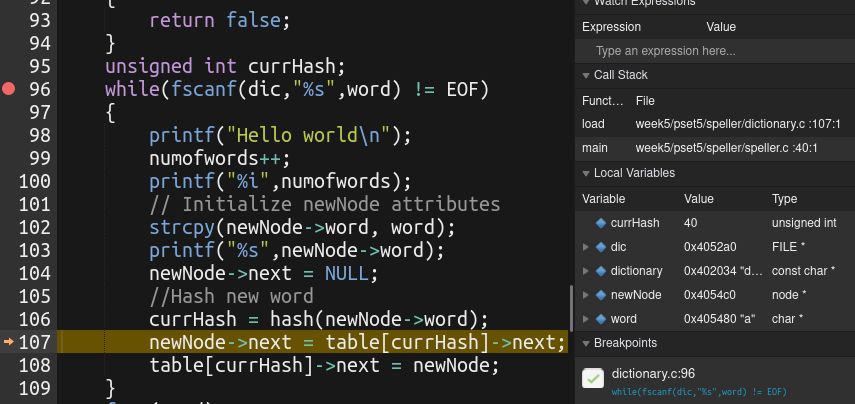This question is related with this other question of mine, in which I am trying to complete pset5: speller. I took Cliff's advice, and additionally executed the debug50 on my code. Since the original question, I did not make big changes in my code, but I bring a different question.
When I am running the debug50 I can see (screenshot below) that table, N and numofwords variables do not exist, when I click to execute the highlighted line of code, Process received SIGSEGV: Segmentation fault this error pops up in the top of the screen. Therefore, I understand that the problem is that I am trying to assign newNode->next = table[currHash]->next; but the computer is not "seeing" table as being anything (otherwise, it should be visible in the right panel, right?).
I still do not understand why the hash function did return something, if N is not visible, this does not fit entirely with what I said previously about table.
Finally, the "Hello world" did print and the first word (aka "a") was correctly assigned to strcpy(newNode->word, word);.
Am I interpreting correctly the right panel? And if so, how is my code wrong? I thought those 3 would be global variables.
Here's my current code and the screenshot of debug50.
Thanks in advance for any ideas.

// Implements a dictionary's functionality
#include <stdio.h>
#include <stdbool.h>
#include <strings.h>
#include <string.h>
#include <ctype.h>
#include "dictionary.h"
#include <stdlib.h>
// Represents a node in a hash table
typedef struct node
{
char word[LENGTH + 1];
struct node *next;
}
node;
// Prototypes
bool traverse(node *head, const char *lookup);
void freelist(node *list);
// Number of buckets in hash table
const unsigned int N = 93;
unsigned int numofwords = 0;
// Hash table
node *table[N];
bool traverse(node *head, const char *lookup)
{
if (strcasecmp(head->word, lookup) == 0)
{
return true;
}
else if(head->next == NULL)
{
return false;
}
else
{
return traverse(head->next, lookup);
}
}
// Returns true if word is in dictionary, else false
bool check(const char *word)
{
// Handle case difference
char *tmp = malloc(8 * strlen(word)) + 1;
strcpy(tmp,word);
*tmp = tolower(*tmp);
unsigned int checkHash = hash(tmp);
node *checkNode = table[checkHash];
return traverse(checkNode, word);
free(tmp);
}
// Hash function (djb2 by Dan Bernstein)
unsigned int hash(const char* str)
{
unsigned int hash = 5381;
int c;
while ((c = *str++))
hash = ((hash << 5) + hash) + c; /* hash * 33 + c */
return hash % N;
}
// Loads dictionary into memory, returning true if successful, else false
bool load(const char *dictionary)
{
// Open dictionary and check
FILE *dic = fopen(dictionary, "r");
if(dic == NULL)
{
return false;
}
// Init. table null pointers
for (int i = 0; i < N; i++)
{
table[i] = NULL;
}
char *word = malloc(LENGTH + 1);
if(word == NULL)
{
return false;
}
node *newNode = malloc(sizeof(node));
if(newNode == NULL)
{
return false;
}
unsigned int currHash;
while(fscanf(dic,"%s",word) != EOF)
{
printf("Hello world\n");
numofwords++;
printf("%i",numofwords);
// Initialize newNode attributes
strcpy(newNode->word, word);
printf("%s",newNode->word);
newNode->next = NULL;
//Hash new word
currHash = hash(newNode->word);
newNode->next = table[currHash]->next;
table[currHash]->next = newNode;
}
free(word);
free(newNode);
fclose(dic);
return true;
}
// Returns number of words in dictionary if loaded, else 0 if not yet loaded
unsigned int size(void)
{
return numofwords;
}
// Unloads dictionary from memory, returning true if successful, else false
bool unload(void)
{
for (int i = 0; i < N; i++)
{
freelist(table[i]);
}
return true;
}
void freelist(node *list)
{
if (list->next == NULL)
{
return;
}
freelist(list->next);
free(list);
}